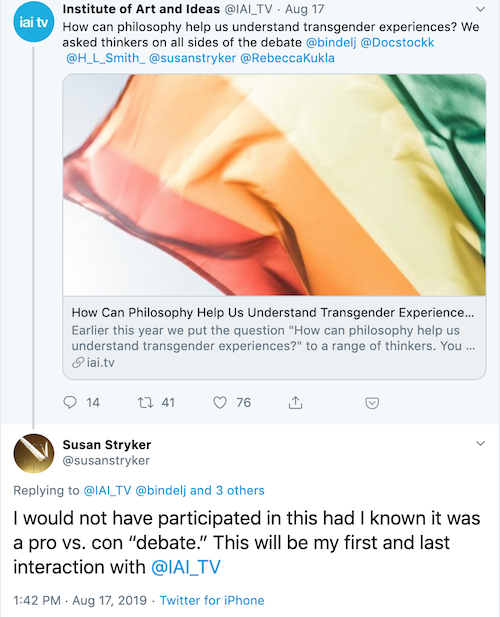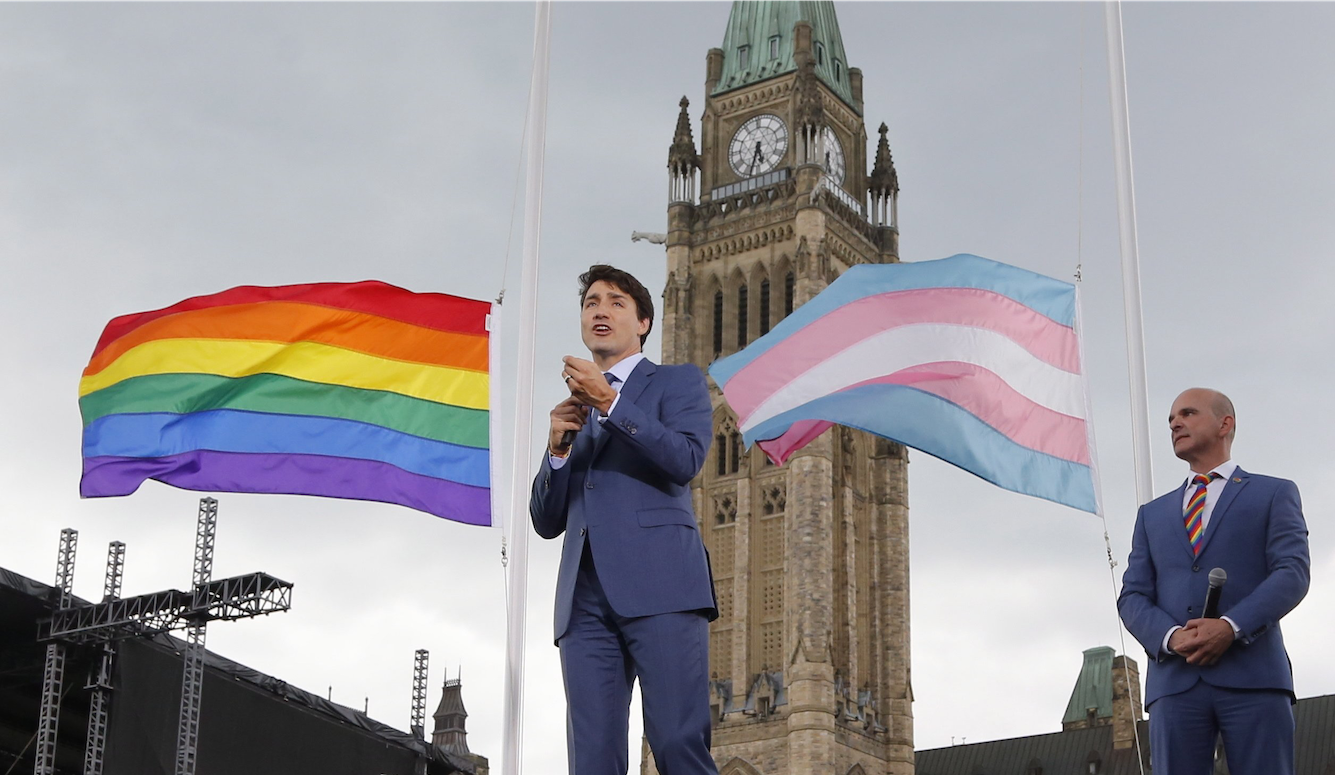Activism
How the Trans-Rights Movement Is Turning Philosophers Into Activists
Can we not treat trans people as the sex they identify with for almost all purposes, and still make some distinctions when it comes to female-only spaces, services and provisions?

On July 3, I received an innocuous-seeming email from the Digital Content Editor of a London-based arts organization called the Institute for Art and Ideas. She asked if I might set out my views on the question, “How can philosophy change the way we understand the transgender experience and identity?” As the expected response was supposed to be only 200 words in length, the task didn’t seem particularly demanding. So I agreed, and sent along a brief answer in which I focused on the now common assumption that everyone has a “gender identity.”
I provided some (necessarily) brief objections to the concept as it is currently being advanced by some trans rights activists, and ended by commenting that philosophers can help people to “understand what a gender identity might be, and whether it’s a fitting characteristic to replace sex in law.” The gender wars in philosophy had been heated since May, igniting with University of Sussex philosopher Kathleen Stock’s Medium post asking why academic philosophers—feminist philosophers, in particular—weren’t contributing to the discussion about Britain’s Gender Recognition Act. Nevertheless, my optimism about the contributions that philosophers can make on this topic had survived intact.
I sent my response to the editor on July 25, and didn’t think much more about it. The next day, the article was published, featuring contributions from a total of six writers, four of them (including me) being professional philosophers. Joining me on the “gender-critical” side (I will explain what this means in some detail below) were Stock herself, and feminist writer and activist Julie Bindel. Writing from a trans-activist perspective were Yale philosophy professor Robin Dembroff, Georgetown University philosophy professor Rebecca Kukla, and Susan Stryker of the University of Arizona. The article was not presented in a for-and-against fashion, but rather appeared simply as a six-part list of brief answers to a common question.

The first I heard about the piece having been published was when the Institute’s Twitter account—@IAI_TV—tagged five of us with a tweet publicizing the article on August 17. By the 18th, there were replies from Kukla and Stryker. Kukla’s tweets included the comment, “I never would have agreed to write this if I had known the lineup,” and “I retract this piece in its current form and context.” Stryker’s tweet was briefer: “I would not have participated in this had I known it was a pro vs. con ‘debate.’ This will be my first and last interaction with @IAI_TV.” Dembroff expressed themselves (they identify as nonbinary and so request the use of “they/them” pronouns) on Facebook, commenting, “If I had known they”—Bindel, Stock, and me—“were part of the series, I would not have agreed to it, as I do not want to legitimize their appearance as gender scholars when they lack the relevant expertise…I would like to retract my interview.”

Colleagues began getting in touch with me, asking me if I’d seen Kukla’s Facebook post (partially archived here), in which she complained that the Institute made it look as if she were involved in “what looks like a friendly ‘debate,’” and claimed that her contribution had been “designed to be a stand-alone piece and NOT part of a symposium that platformed TERFs.” (The latter term, originally an acronym standing for “Trans-Exclusionary Radical Feminist,” is now commonly used as a standalone slur to refer to gender-critical women—including, in this case, two fellow female philosophers.)

Soon after writing that Facebook post, Kukla announced that the Institute had agreed to take the piece down. But when some of us checked the Institute’s website, the article was still up in its original form. So we assumed the Institute was going to stand its ground—as they should have. Their motto, after all, is “changing how the world thinks.” I tweeted on August 25, congratulating the organization for sticking to its principles.
But three days later, tweets started to flow in asking where the article had gone. Visitors to the original link got a dead screen marked “Page not found.” (The full set of contributions have been preserved on Leiter Reports, however). I got back in touch with the commissioning editor, seeking clarification, but received no response. For the next week, no one at the Institute communicated with me, Stock or Bindel. We simply assumed that we’d been de-platformed due to successful lobbying efforts by Dembroff, Kukla and Stryker.
Finally, on Sept. 6, another member of the Institute got in touch, saying: “We apologise for unpublishing the article. This was a temporary solution. We have republished the piece and are currently contacting more writers to contribute to it, so that we represent a full spectrum of positions in the article.”
“We have however slightly re-edited the introductory paragraph,” she continued, “and retracted the contributions of Robin Dembroff, Rebecca Kukla and Susan Stryker as requested by them.” What the email didn’t tell me, but which I found out from reading the republished article, was that Dembroff, Kukla and Stryker not only had retracted their contributions, but co-authored a separate “retraction statement,” which the Institute had published and linked to from our republished piece.

In their statement, the three claimed to have been the victims of “non-consensual co-platforming”—which meant being put on the same internet page as us. Yet as philosopher Dan Kaufman pointed out in a recent blog post, “there is no such standard in our discipline, according to which when asked to contribute to something, one’s consent to appear alongside all the other contributors must be solicited.”
Dembroff, Kukla and Stryker also claimed that our views constituted “acts of violence,” and suggested that entering into debate with us might be analogized to engaging with the question of “whether the Holocaust actually happened, or whether corrective rape should be used to cure lesbianism, or whether or not the white race is superior to all others.”
The extravagance of this rhetorical gambit should be shocking to philosophers and laypeople alike—especially insofar as it grotesquely co-opts such apocalyptic horrors as the extermination of Europe’s Jews and the African slave trade as a means to discredit a philosophical and political position on the nature of sex and gender. It is hard to imagine that the authors’ use of “corrective rape” being “used to cure lesbianism” was anything other than a grotesque barb hurled at me, Stock, Bindel—all three of us being lesbians.
The Institute’s staff were decent enough to let me respond. My main points were that debate over gender is a reasonable—as opposed to unreasonable—disagreement, no matter how badly the trans-activist side behaves, and that those on that side should “at least leave the rape talk out of it.”
* * *
In the past year, I’ve asked many of my colleagues across philosophy whether they can recall a time where things were so heated over a philosophical issue. Abortion? No. Euthanasia? No. Animal rights? Not really, no. Some can come up with specific anecdotes, like the 1946 confrontation between Ludwig Wittgenstein and Karl Popper in which Wittgenstein apparently brandished a fireplace poker to make his points, and after the argument grew heated, threw down the poker and stormed out of the room (all documented in David Edmonds & John Eidinow’s popular book, Wittgenstein’s Poker: The Story of a Ten-Minute Argument Between Two Great Philosophers). But if a single incident such as that can fill one book, there may well be many books to be written about philosophy’s gender wars by the time today’s embers cool to ash.
What’s the substantive disagreement between what I’ll call “establishment feminist” philosophers—who tend to toe the trans-activist line—and “gender-critical feminist” philosophers such as myself? Stock addressed some of these issues in an essay recently published by Quillette. There are a cluster of related disagreements—over the nature of sex and gender, the terminology used to describe each, and the weight to be accorded to self-declared assertions about identity.
Some establishment feminist philosophers think sex is socially constructed. Others agree that sex is biological, but believe that gender is socially constructed. They all seem to agree that “man” and “woman” are gender terms rather than sex terms (although some admit that the terms are generally used for sex and gender interchangeably). As well, they all seem to agree—albeit with caveats in many cases—that transwomen are women and transmen are men. Some think it’s perfectly fine to take this as a starting assumption. Some even treat delivering this result as a baseline condition of adequacy for theory in this area—which relegates philosophy to the mere service of explicitly political goals.
Most establishment feminist philosophers have bought into the idea of a “gender identity,” a subjective sense that is independent of sex. It is common to insist that it is not just trans and “gender-diverse” people who have a gender identity, but rather that everyone has one. And if you don’t feel like you have one, that can be explained away by saying you just don’t notice it, because when your sex accords with your gender identity, you feel no incongruence.
Gender-critical feminist philosophers, by contrast, are most interested in applied issues to do with the social impacts that flow from changing ideas about gender—such as in regard to the introduction of policies that define a person’s sex purely according to self-identification, essentially replacing sex with gender identity under the law.
Gender-critical feminist philosophers oppose a policy of self-identification alone, oppose the inclusion of male people in women’s sport, oppose the inclusion of male people in women’s single-sex spaces or services (such as changing rooms, and domestic-violence or rape shelters), and oppose open access to women’s single-sex provisions (such as women’s prizes or award shortlists). They are concerned with the impacts of the wider “gender-identity” narrative upon children and young people, and on gay and lesbian youth; particularly as it displaces the idea of gender as a set of harmful norms, imposed on the basis of sex.
They urge caution in regard to policies that demand immediate “affirmation” in regard to trans-identified children. They deny that sex is socially constructed, and they make a sex/gender distinction. Such feminists generally use “man” and “woman” as terms relating to sex, not gender, and contest the idea that “transwomen are women” in the simple, sloganeering way that has become popular. They also are skeptical about the idea of a “gender identity” that apparently exists in the same way that many religious people have thought that souls exist. For gender critical feminists, gender is a cage—a set of harmful norms that constrain people’s options for the arbitrary reason that they are of one sex or the other. These norms tend to hurt female people more than males—although they do hurt both.

Some of the pushback against gender-critical feminists is about law and policy—over changes to birth certificates or access to bathrooms. But as the controversy at the Institute for Art and Ideas exemplifies, most of the pushback is ideological, and aimed at suppressing any questioning of the simple narrative that presents transwomen as women, full stop. To deny the mantra is heresy. (The primary focus is on transwomen, rather than trans people more generally, because conflicts of interests tend to arise between women and transwomen, in particular over access to women’s spaces, services, and provisions.)
The foundational commitment of philosophy, my field, is the pursuit of truth. While our largely single-authored academic papers can give the impression that we work independently, the discipline is collaborative. We discuss ideas with our students and our colleagues. We give talks and answer questions at conferences. If we are lucky, people may criticize our ideas in print, and we may incorporate their criticism in revising our views in future work. We send papers out to journals and (if they are not immediately rejected) we get comments from reviewers and revise our work. Everywhere, we are helping to make each other’s ideas better, brighter and sharper. We do all this in order that we may get closer to the truth. Our very academic freedom is justified primarily—some might say, solely—according to its instrumental value in this truth-seeking project.
This means there’s a strong presumption in favour of constructive engagement between philosophers. There are all sorts of minor transgressions that manifest themselves in the philosophy seminar room or conference space, and which attract disapproval—like grandstanding (asking questions designed to showcase your own cleverness or specialist knowledge rather than help the speaker); or evading (changing the subject, shifting the goalposts, pretending you never meant what you clearly said); or table-thumping (simply insisting that your point is correct, or trying to force your opponent’s acceptance of it without actually persuading anyone of the truth of your position). One of the worst norm violations is letting feelings creep in. We teach our students that the ideal philosophical discussion is dispassionate. Others can’t be expected to share your feelings. You have to do the hard work of providing them reasons and arguments.
Given these longstanding values, and the disciplinary norms built up to protect them, it is alarming to observe the emergence of a group of activists within the profession who are attempting to assert that there can be no debate when it comes to the question of gender identity. Equally alarming is the alternative claim, which is that to such extent there is room for discussion, it may be had only insofar as participants “do not call into question the integrity and sincerity of trans people nor the validity of their own understanding of who they are”—as 33 establishment feminist philosophers insisted recently on the pages of the American Philosophical Association’s blog. (A recent critique by philosopher Spencer Case, published at Quillette, likened this approach to that of Mormon Sunday school teachers who encouraged obedience through the use of a parable: “Allegedly, a tethered goat will move as far away from the post as it can, so that the rope remains taut and never touches the ground. If only the goat would relax, the story goes, it could be content in the space it was given, which contains all the grass it needs. The moral is supposed to be that you can be happy within the church’s strictures, but the analogy backfires—who wants to be a goat on a rope in the first place?”)
* * *
How did things get to the point that some professional academic philosophers felt they had to de-platform themselves just to avoid appearing on the same web page as other professional academic philosophers? Since when did analytic philosophers, normally sticklers for precise language, describe views they don’t like as “violence”?
One possible explanation comes from the idea that denial of gender identity is a harm. The established notion of “first personal authority” is the idea that one has privileged (albeit not infallible) access to one’s own mental states, including one’s beliefs, desires and feelings, and that one’s gender identity is just such a mental state.
But even if one accepts this idea, it’s not clear that denying or questioning the proposition that “transwomen are women” requires denying a person’s own authority over her mental states. I can accept her claim that she has the gender identity “woman” without accepting that having a “woman” gender identity makes someone a woman.
The appropriateness of treating interlocutors as though they are doing harm with their assertions depends on the persuasiveness of the argument that they are in fact doing harm. And there are reasonable grounds for disagreement here, even setting aside difficult philosophical questions about the distinction between psychological and physical modes of harm. But in the past, philosophical disagreements over what is and isn’t a form of harm haven’t generally resulted in abusive behaviour, deplatforming and gatekeeping. British philosopher John Broome thinks that almost all the greenhouse gas emissions associated with our actions do harm to the world. Walter Sinnott-Armstrong of Duke University disagrees. It’s a very serious subject. Yet you don’t see Broome calling Sinnott-Armstrong a “cunt” on social media (as Rebecca Kukla has done to me).
Here’s another possible explanation: From the point of view of establishment feminist philosophers, the disagreement over transwomen was settled long ago, so it’s infuriating for them to see gender-critical feminists bringing it up again. But remember that until recently, only very small numbers of male-born people asserted that they were actually women. And almost all members of these small groups of people were transsexual (a now unfashionable word that describes people suffering from severe sexed-body dysmorphia), most of whom had sex-reassignment surgery and thereby acquired female-appearing bodies.

Things are completely different today, with much larger-scale social uptake of newer ideas about gender and gender identity. Many more people now identify as trans, and many more of the people who identify as transwomen are choosing to keep their bodies male-appearing, including keeping their penises. This makes a difference in spaces involving full or partial nudity. So anything that was settled by previous generations cannot be assumed to be settled now. Trans people deserve full human rights and the legal protections necessary to deliver them. But it would make much more sense for such legal protections to be granted on the basis of their being transgender, not on the basis of being female. Transwomen and female people need different protections in at least some cases.
Perhaps another reason why things have gotten ugly is that the underlying disagreement is not one that can be settled by reason alone. Perhaps there is simply a fundamental moral disagreement over the extent to which a person’s internally experienced identity matters, and should be respected and affirmed by others. If you can’t settle things with reason, yet you think they must be settled somehow, you’ll have to deploy other tactics. Is this the explanation we’ve been looking for?
Let’s start with the idea that identity matters. In almost all the cases of identity we’re familiar with, there’s some fact that underwrites the corresponding identity. A white-appearing person who identifies as indigenous is accepted as indigenous because of her ancestry (and perhaps her cultural ties, acceptance by indigenous communities, and so forth). There are facts that make her identification true (and that, if absent, would lead to her identification being rejected). But when a male-born person asserts that they are a woman, what are the facts at issue? There are many answers we could give here, such as that the person has dysmorphia about their sexed body, or has dysphoria in regard to gender roles, or has lived life “passing” as a female person for some length of time, or is accepted as female by other members of the community. Unfortunately, establishment feminist philosophers—following trans activists in the wider society—tend to reject all such answers, and assert that subjective identity is all that matters: If someone asserts with apparent sincerity that they feel like a woman—or is a woman—then the person is a woman. But that’s like saying that a person is indigenous if she says she is, and that any questions about ancestry are tantamount to the denial of one’s humanity.
But we can supplement the claim that identity matters, and thereby get closer to fully explaining the ugliness of this debate.
Add to it the claim that trans people are one of the most vulnerable social groups in society; and that one of the most humane and effective means we have for lessening their vulnerability is to affirm their gender identity, and thereby lessen the suicide risk associated with dysmorphia and dysphoria. To the extent that questioning the veracity of gender identities may be said to interfere with the social acceptance of transgender people, such questioning may be cast as morally reprehensible, uncaring and dangerous.
If true, this would explain the abusiveness of establishment feminist philosophers—and the wider trans-rights activist community. This view presumes such high stakes that it can be invoked to justify even the most uncivil and abusive forms of discourse. But it also undermines the very idea of truth-seeking, since embedded within the argument is the idea that it doesn’t really matter whether transwomen are women: All that matters is that we act as though they are women, because the focus is on the instrumental value of assertions supplying trans women with a certain kind of emotional and moral support, not determining the existence of an objectively real truth.
Under this analysis, when gender critical feminists show up and argue that transwomen are not actually women, or that they shouldn’t be treated as women for all social and legal purposes, they miss the point and talk past the establishment feminist philosophers. The point of the discussion, as the establishment feminist philosophers see it, isn’t to determine the truth of the underlying claims, but to provide succour to a vulnerable community. They are doing politics and calling it philosophy.
Adding to the frustration and anger of the establishment feminist philosophers is the fact that there’s literally no way they can communicate their real argument—namely that we should act as if trans women are truly women, even if we know they are not—because if this argument were said out loud (or, worse, stated in print or online), the whole project would collapse. Transwomen would know what even their most vocal allies secretly believe. The only possible strategy is instead to yell out conclusory slogans and then protect them from contradiction with all available methods—insults, attempts to deplatform, social ostracism, reputational damage, complaints to employers, online harassment, the lot.
Even if one were to accept the goal of suppressing truth-seeking for the purpose of helping a vulnerable group, the argument is dubious. The link between suicidal ideation and social treatment needs to be established, whereas often it is just assumed. If the suicidal ideation has other causes—such as childhood sexual abuse, or mental-health problems—then social treatment as the sex one identifies with is not likely to resolve it. If trans vulnerability can be met with third spaces rather than by granting access to binary spaces in line with gender identity, then the link between vulnerability and full inclusion in line with sex identification is severed. Many people under the trans umbrella today seem to identify as trans or non-binary for political reasons, not because of gender dysphoria. It is unlikely that these people have suicidal ideation in response to not being accepted, or that they face the same vulnerabilities as people with dysphoria. To adapt the title of one of my previous articles, we should not let glitterbeards hitch their carts to transsexual wagons, especially when that creates problems for women.
Furthermore, there are other important considerations at play. Women comprise half the population of the world, and have their own long history of marginalization. Do their interests in determining what it means to be female, in retaining female-only spaces (which are important to survivors of male violence, of which there are many), and in being able to access provisions that counter their underrepresentation (e.g. in sports or in politics) really count for nothing in light of the vulnerability of trans people? Can we not treat trans people as the sex they identify with for almost all purposes, and still make some distinctions when it comes to female-only spaces, services and provisions?
The controversy that played out on the web site of the Institute for Art and Ideas is just one small battle in this larger war of ideas. I cannot say for certain how it will ultimately end. But my hope is that the activists among the philosophers will not displace the truth-seekers. For whose values, commitments or ideals can we be so confident in, that we would accept them as a compulsory starting point for any enquiry? We must all defend our right to say things that other people don’t like, lest we all become that “goat on a rope.”






